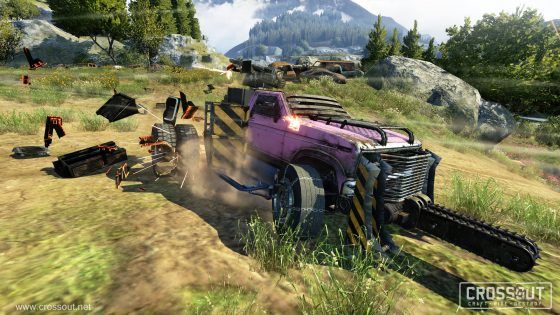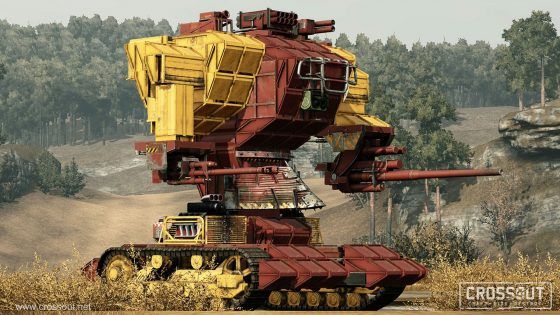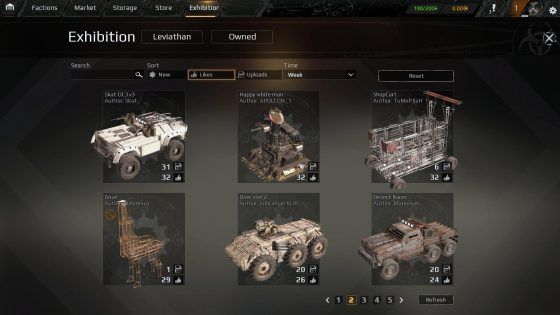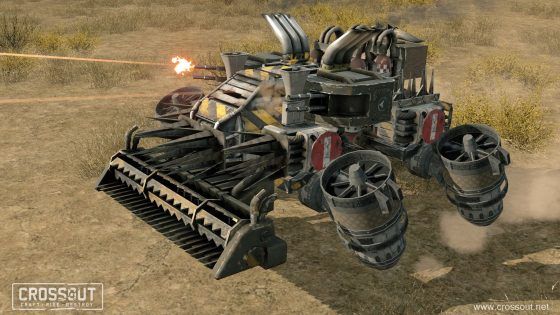Part Twisted Metal, part Minecraft, Gaijin’s latest game creation combines vehicular destruction with the ability to build almost anything. We’ve been covering Crossout for quite some time, but it has only been in a playable Closed Beta state since April, 2016. While at E3 2016, I had the opportunity to discuss some of the recent changes to the game and get to test out my demolition derby skills.
Currently, Crossout has two major game modes: Missions and Raids. Missions are the PvP battlegrounds that come in two flavors. The first is a base assault mode where you can either attempt to destroy every enemy vehicle or use strategy to capture their base by holding it for a set amount of time.
The second PvP mode, which isn’t unlocked until Engineer Reputation level 10, is called Storm Warning. This is what you would initially expect from a game like Crossout. It’s a free-for-all, mayhem filled event with a continuous storm that closes in around the players. Any vehicles caught in the storm are destroyed, and its only purpose it to funnel players into tighter and tighter spaces. Essentially, this acts as a match countdown timer with very sharp teeth.
The idea of PvE is something relatively new in Crossout, but it definitely makes sense for testing out all kinds of creations and farming new parts. The initial PvE modes are sieges, which require groups of players to drive around blowing the hell out of NPC oil pumps. Each player gets two lives and after that you can either buy back in or wait on the sidelines. Once you reach level 10, you can turn the tables with Invasion. In this game mode it’s up to the players to stop a band of raiders from destroying their oil pumps.
If traditional PvE isn’t your thing, Gaijin also introduced a new way to mess with your fellow players, especially if you like building the biggest, baddest monstrosities around. With the introduction of “Leviathans,” players can create custom boss machines that will be let loose during the more difficult PvE missions. Although the A.I. will control them, creators will reap rewards when their Leviathans defeat human players in combat.
Even though there isn’t a replay system in place yet, players will be able to track the stats of their Leviathans and can withdraw them to make improvements at any time. Of course, these won’t be available to just any newcomer. Leviathans are a high-level feature in Crossout and require a certain level and Engineer faction experience.
Although I personally haven’t gotten past the basic wheel and track vehicle designs, many players have created some interesting contraptions that you wouldn’t even think were possible. I’ve seen everything from bouncy balls to rocket cars and shopping carts. Some ideas don’t have much functionality besides looking neat while others take the game in a direction the developers didn’t expect.
This has even led to new ways to play the game. According to the Crossout team, they noticed a group of players that were building vehicles so large they couldn’t move on their own. Instead, they would act as defensive towers that teammates would push around the maps. This shifted the game mode from assault to tower defense. Other players have tried similar ideas, such as hooking cars together so one could tow while the other shoots. The possibilities in Crossout truly seem endless.
Sharing these crazy ideas is also highly encouraged and is a main system in Crossout. In the “Exhibitor” tab, players can upload any or all of their vehicle designs where others can vote, test drive, or even download them. This allows for easy sharing of the coolest, or most powerful, creations in the game.
While sharing designs is completely free in Crossout, obtaining the required parts isn’t. New items can be obtained by either playing matches or buying them in the Market. Crossout has an entirely player-driven economy with a slight catch. All items on the market need to be purchased with the premium currency called coins. You can obtain coins by either selling your own items on the Market or buying them with real money. This does create an economy that relies on at least a few paying players to actually function, but it also gives free users the ability to obtain premium currency by selling their items.
Although this essentially creates an environment where raw power can be purchased, it isn’t something that’s gated to non-paying players. In its current state, it will simply take free players longer to obtain the best items in the game. We’ll have to wait for the Open Beta, and a larger influx of players, to accurately judge the fairness of this system and how much effect the more powerful items will have overall.
Crossout is definitely a game we plan to keep our eyes on and we can’t wait to see how it changes when there is a larger community. The idea of combining the building controls of Minecraft with destructive vehicular combat can lead to some very interesting battlefields and the sheer creativity shown so far has been amazing.



